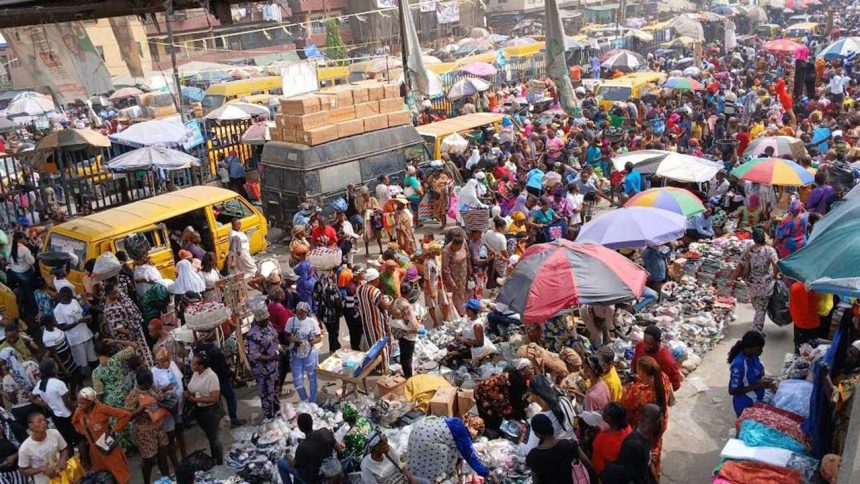Rising inflation, high interest rates, and naira depreciation could push an additional 13 million Nigerians below the national poverty line by 2025, according to a new report titled ‘2025 Nigerian Budget and Economic Outlook’ by PricewaterhouseCoopers International Limited (PwC).
The report stated, “Macroeconomic pressure points such as rising inflation, high interest rates, and naira depreciation may drive an additional 13 million people below the national poverty line by 2025.”
PwC further noted, “The number of people living below the national poverty line is projected to increase by about 13 million by 2025,” attributing this rise to the country’s worsening inflation and high cost of living.
The report highlighted these economic headwinds as major contributors to the projected increase in poverty levels.
According to the National Bureau of Statistics, Nigeria’s headline inflation rate stood at 34.80 per cent as of December 2024.
Also, the President of the Manufacturers Association of Nigeria (MAN), Chief Francis Meshioye, disclosed that the manufacturing sector faced severe challenges in 2024, driven by macroeconomic issues such as high inflation, soaring interest rates, and the depreciating naira.
On a positive note, however, the Central Bank of Nigeria (CBN) is projecting the economy to grow by 4.17 per cent this year, driven by ongoing reforms and stabilising inflation, Governor Olayemi Cardoso said yesterday.
Reforms introduced by President Bola Tinubu in 2023, including the removal of the petrol subsidy and two devaluations of the naira, have contributed to rising inflation in Africa’s most populous country.
Cardoso stated at a conference that inflation, currently at 34.8 per cent, is expected to decline as the reforms begin to yield positive results. He also noted that foreign exchange reserves are expected to rise gradually, supported by increased oil production.

Oil output is forecast to reach 2.3 million barrels per day by mid-year, Cardoso revealed. According to him, Nigeria recorded foreign exchange inflows exceeding $6 billion in 2024, pushing foreign exchange reserves to over $40 billion.
Cardoso emphasised that the Central Bank’s priority remains maintaining price stability and strengthening market confidence. To achieve this, the bank plans to improve transparency and efficiency in the foreign exchange market.
“With limited opportunities for FX arbitrage, we anticipate greater interest in real sector development,” he added.
Similarly, Nigeria’s economy is projected to witness a decline in inflation and stabilisation of foreign exchange (FX) rates by 2025 as reforms in key economic sectors and policy adjustments take effect.
Experts shared this projection yesterday in Lagos during the Executive Roundtable on Nigeria’s 2025 Budget and Economic Outlook, organised by PwC and BusinessDay Media.
The event, themed ‘Insights and Strategies for Navigating Nigeria’s Economic, Fiscal and Policy Landscape in 2025’, highlighted the country’s fiscal challenges and opportunities.
The experts noted that government revenue is expected to grow in 2025 due to ongoing reforms. However, achieving the ambitious revenue target of N36.35 trillion will require substantial effort .
The Chairman of the Presidential Committee on Fiscal Policy and Tax Reforms, Taiwo Oyedele, emphasised that the high Monetary Policy Rate (MPR) is contributing to inflation rather than reducing it. He explained that businesses are forced to secure financing for working capital at higher costs, thereby driving up prices.
Oyedele expressed optimism about inflation easing in 2025. He observed that while scepticism persists, the average inflation rate for 2024 stood at 33 per cent, and if conditions remain stable, the nominal inflation rate for 2025 is projected to drop to 25 per cent.
He also highlighted external factors that could impact Nigeria’s economy. According to Oyedele, President Donald Trump’s pledge to intensify oil and gas drilling may result in lower global oil prices. While this could alleviate price pressures, it presents a trade-off, as government revenue might decline due to reduced oil prices.
“The Central bank is going to introduce a code for FX by the end of the month which would improve the transparency issue. And once it’s addressed, the pressure on the FX has been taken off significantly.
“About $20 million every day is off the market. Some of the reforms we are doing from the fiscal side, it’s about $4 billion we are taking off the market as well. Nigerian businesses are being asked to pay levies, taxes, and regulatory fees in dollars. It’s about $4 billion. Once we pass our tax bills, that’s off the market. As we’re taking off those pressure from the market, we’re seeing improved liquidity coming in,” he said.
He said the Nigerian National Petroleum Company (NNPC) Limited is expected to contribute approximately $10 billion to the federation account this year, compared to less than $2 billion remitted last year.
He stressed the need for the industry to shift its focus from merely stabilising the naira exchange rate to fostering its recovery.

Oyedele expressed his belief that the current exchange rate does not reflect the naira’s true value, asserting that an exchange rate of N1,500 per dollar is not a fair valuation, as the naira remains undervalued.
The Chief Executive Officer of First Bank of Nigeria, Olusegun Alebiosu, highlighted the likelihood of a drop in food inflation within the year, attributing it to increased investments in agriculture expected in 2025.
Partner and Lead at PwC Strategy & Practice, West Market Area, Olusegun Zaccheaus, stated that factors such as improved revenue generation, debt sustainability, broad policy interventions, monetary policy alignment, fiscal strategy highlights, and addressing key issues for macroeconomic stability will shape Nigeria’s economy in 2025.
He noted that FX stability, price stability, and interest rates are critical monetary issues for 2025. According to him, easing volatility will depend on price discovery, transparency, market friction, liquidity, supply-demand backlogs, and market and investor confidence.
“Inflation may ease as supply-driven inflationary pressures subside and monetary policy tightening is sustained. However, the Nigerian government’s planned expenditure increase to N47.9 trillion in 2025, coupled with the introduction of a new minimum wage, is expected to drive inflation. As a result, the CBN is likely to maintain a tight monetary policy to manage these inflationary pressures,” he explained.
He further highlighted that the planned increase in telecom tariffs and rising electricity prices are expected to contribute to sector-specific inflation.
While improved price stability in petroleum products (PMS) could help mitigate some inflationary pressures, the overall impact on sectors such as telecommunications and energy may still result in higher consumer costs.



